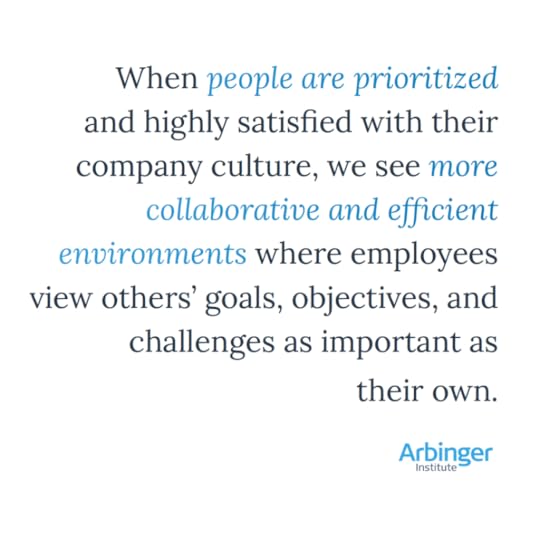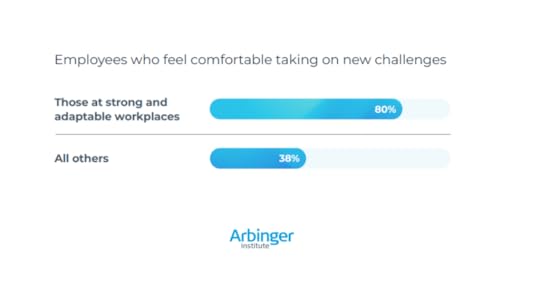Unleashing performance: How adaptability at work helps improve team performance
A positive company culture is no longer a luxury, it’s a strategic advantage. It equips organizations to adapt, innovate, and thrive regardless of their challenges. In fact, our data shows that fostering adaptability at work creates a proactive and confident workforce, which is critical to success.
Arbinger, in partnership with Ascend2 Research, surveyed 440 professionals across different regions of the globe to discover what the most successful company cultures look like, and how impactful culture is in improving team performance. We’ve compiled our findings in our 2024 workplace culture research report: Unleashing Performance: How Adaptable Cultures Drive Sustainable Results.
In this blog, we’ll:
Share an overview of Arbinger’s 2024 workplace culture research reportExplore proven strategies to improve team performanceHighlight why is adaptability important in the workplaceProvide a link to download the full reportThree ways to improve team performanceOur report found that when people are prioritized and highly satisfied with their company culture, we see more collaborative and efficient environments where employees view others’ goals, objectives, and challenges as important as their own.

Our findings reveal that investing in leadership development, team performance, and inclusion are three key areas that directly impact satisfaction with culture and a working environment.
In fact, companies that prioritize leadership, employee engagement and accountability, and inclusivity are 11x more likely than others to have employees who are very satisfied with their company culture.
In the report, we answer: “Why is adaptability important in the workplace?” as it relates to these three areas:
Developing leaders who empower othersIn our research, we found that less than one-third (29%) of professionals surveyed report that their company places a high priority on developing leaders who empower others. However, leaders who empower their teams foster a culture of trust and respect, promoting team engagement and collaboration.
Just take a look at these results from organizations that prioritize leadership development compared to all others:

If these results don’t speak to the importance of leadership development, this stat will: Arbinger found that professionals working for organizations prioritizing leadership development are nearly 4.5x more satisfied with their organization’s culture than others.
Drive team performance through engagementThe bottom line is that engaged employees are more satisfied, efficient, and collaborative than their less-engaged counterparts. Our research found that organizations promoting the development of engaged and accountable employees have significantly higher culture satisfaction rates than organizations that don’t prioritize employee engagement as heavily (61% say they are very satisfied with their company culture, compared to 14% of all others).
We also found that when it comes to improving workplace performance, focusing on engagement and accountability can:
Improve efficiency. Companies that prioritize improving team performance are over 5x more likely than others to have achieved excellence in efficiency, according to professionals surveyed (53% vs 10%). Improve communication and collaboration. Overall, only 21% rate communications and collaboration at their organization as excellent. However, those who work at organizations prioritizing employee development are nearly 5x more likely to rate communications and collaboration as excellent than all others (48% vs 10%). Embed inclusion into the core of culture
Embed inclusion into the core of cultureCreating inclusivity and belonging within a company culture is essential for ensuring diversity in perspectives, which fuels innovation, drives engagement and productivity, and promotes psychological safety among employees.
Nearly all professionals surveyed report that investments in inclusion efforts have increased or stayed the same since 2020, with 43% reporting an increase and 47% saying they remain unchanged. Just 4% report decreases.
In our research, we found that those who work for organizations that prioritize inclusion are significantly more likely to describe their fellow employees as reliable, collaborative, adaptable, communicative, accountable, inclusive, proactive, and self-aware.
Look at the comparison and its impact on workplace performance here:
 Why is adaptability important in the workplace?
Why is adaptability important in the workplace?Our research indicates that a strong and adaptable company culture breeds organizational success. Just 23% of professionals surveyed describe their company’s organizational health as strong and adaptable, but this group exhibits significantly more positive attitudes and results compared to their counterparts in less-than-ideal environments.
An adaptable workplace culture sets employees up for success. Our data shows that those in strong and adaptable environments are about 110% more comfortable taking on new challenges than others. That stat alone should prove the importance of adaptability at work!
 Unleash performance with adaptability at work
Unleash performance with adaptability at workIf you enjoyed the stats highlighted in this blog post, there are plenty more where that came from! In our 2024 Workplace Culture Research Report, we dive deep into the importance of adaptability at work (and ultimately, the undeniable value of a strong workplace culture). Download your copy today.
 hbspt.cta.load(23346030, 'd743e15b-e020-435b-88ac-4302adc3b558', {"useNewLoader":"true","region":"na1"});
hbspt.cta.load(23346030, 'd743e15b-e020-435b-88ac-4302adc3b558', {"useNewLoader":"true","region":"na1"}); The post Unleashing performance: How adaptability at work helps improve team performance appeared first on Arbinger.
Arbinger Institute's Blog
- Arbinger Institute's profile
- 375 followers



